Shadow Warrior (62 page)
Authors: Randall B. Woods

Barbara and Clare Luce, Rome
(The Colby Family Collection)

Barbara and other members of Saigon's elite, Cercle Sportif, Saigon, 1960
(The Colby Family Collection)
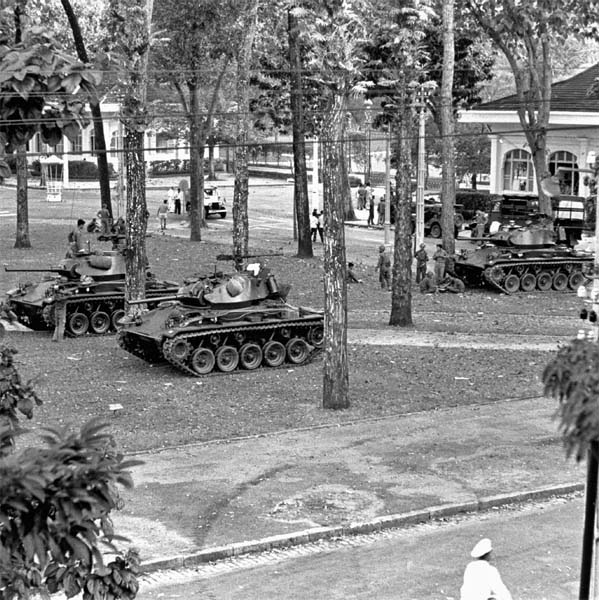
1960 Coup, Saigon, from the Colbys' upstairs window
(The Colby Family Collection)
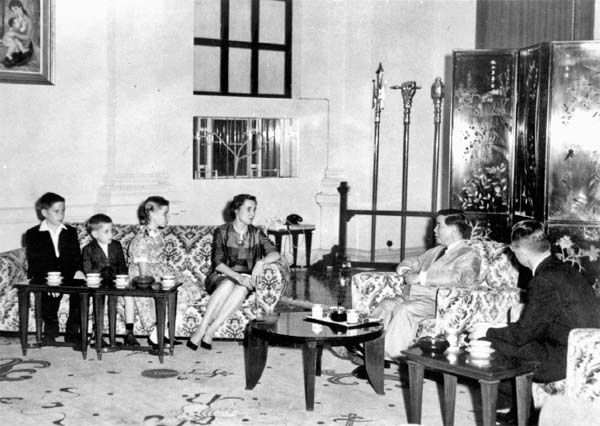
The Colby family's farewell to President Ngo Dinh Diem, Saigon, 1962
(The Colby Family Collection)
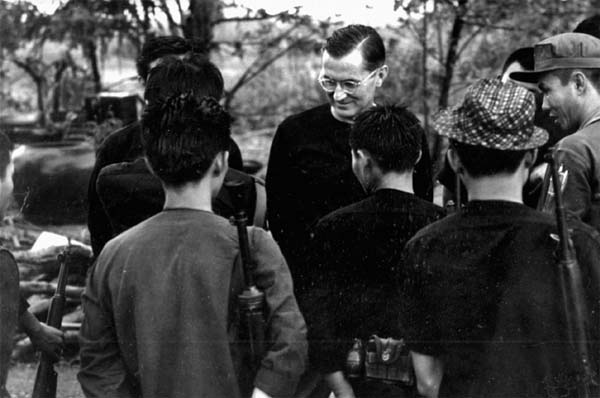
Colby goes native?
(The Colby Family Collection)
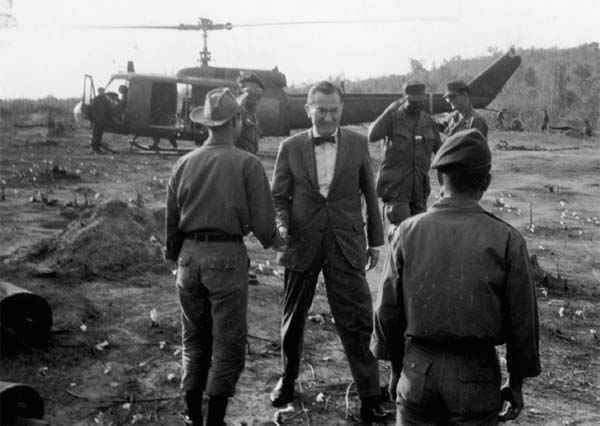
Colby, the American proconsul
(The Colby Family Collection)

Colleagues
(The Colby Family Collection)
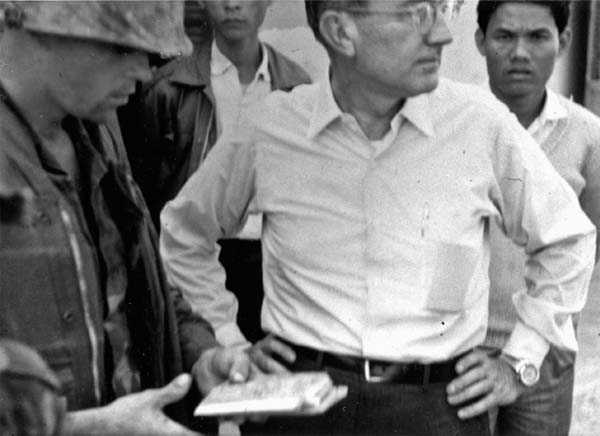
Ambassador Colby, DEPCORDS
(The Colby Family Collection)

Colby wanted poster, Washington, DC, 1972
(CIA Library)
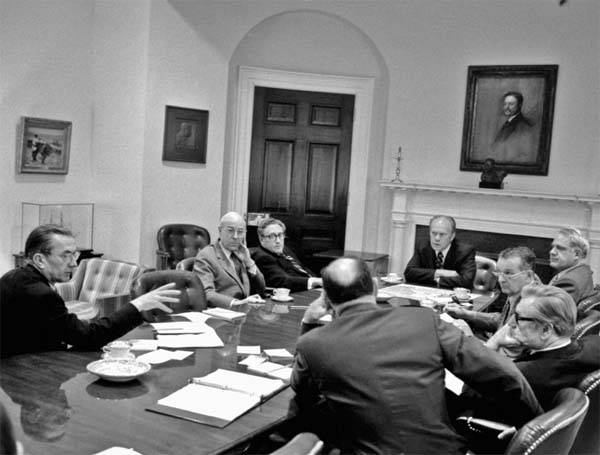
Colby presents to the Ford foreign policy team
(Gerald R. Ford Library)
Back at Langley, Colby went immediately to see Schlesinger. He had assured the DCI that he had told him everything about the Agency's involvement or noninvolvement with Watergate. To Colby's relief, Schlesinger declared that he assumed that Colby was as much in the dark on the burglary of the psychiatrist's office as he was. Nevertheless, the DCI was in one of his cold rages. What other ticking time bombs were being concealed within the clandestine services? They would tear the place apart and “fire everybody if necessary” to find out. At Schlesinger's direction, Colby drafted a memo to all officers, ordering them to reveal any knowledge of activities that were illegal, beyond the scope of the CIA's charter, or both. In a separate communication, Colby, also at the DCI's direction, invited ex-employees to come forward as well.
57
Schlesinger's insensitivity to the simple dictates of politics and psychology was never more apparent than in this particular move. A letter from Colby, the man who wielded the axe, inviting them to confess any sins of the past! What were the chances that some ex-officers were going to volunteer any information they had to the press as well as to the Agency? The DCI asked Colby to supervise the compilation of wrongdoings, putting the inspector general and his staff at his disposal.
Colby had to tread a fine line. He was part of the past himself, a CIA old-timer. He did not want to appear disloyal to Helms, but he did not want to be associated with previous misdeeds, or with efforts to sweep them under the rug. Colby was in due course told about the letters from James McCord to the Agency warning that the White House staff, led by Charles Colson, had embarked on a campaign to blame Watergate on the CIA, arguing that it was part of an Agency plot to do in President Nixon. Before Colby could notify Schlesinger, another of his lieutenants told him of the McCord missives. The DCI was furious: “His anger had to be experienced to be believed,” Colby later recalled. “For the firstâand onlyâtime I feared that Schlesinger had become suspicious that I too, as an old Agency hand, was trying to keep secrets from him.” But Colby was allowed to get on with his assigned task.
58
By the time the last officer had come forward, the inspector general had compiled a list of “potential flap activities” that ran to 693 pages. The “family
jewels,” as one wag would term them, included domestic spying via MH/Chaos; the mail-intercept program; the Agency's contacts with Hunt and the other members of the Plumbers team; its cooperation in the scheme to frame Daniel Ellsberg; surveillance of journalists as part of the effort to identify the source of leaks within the government; experiments with mind-altering drugs, which had led to the suicide of one CIA officer; and various assassination plots in which the CIA was directly or tangentially involved.
59
Colby remembered thinking that the list, covering the entire twenty-five years of the Agency's existence, wasn't really so bad, especially in light of what he knew about the NKVD, MI-6, and other intelligence shops. Indeed, the White House had found the CIA so uncooperative in its campaign of dirty tricks that it had had to form its own “intelligence group,” the Plumbers. But the United States, unlike the United Kingdom, had no Official Secrets Act. The public mood, recently so enamored of James Bond, 007, with a license to kill, was in an ugly and unforgiving mood. Colby concludedâand Schlesinger concurredâthat for the sake of the American intelligence community, the family jewels should be kept locked away.
    Â
ASCENSION
O
n May 9, 1973, Colby received an unexpected call from Alexander Haig, who had replaced Haldemanâat last a casualty of Watergateâas White House chief of staff. There was going to be a cabinet reshuffle. Attorney General Richard Kleindienst was going to have to resign because of Watergate, and President Nixon intended to replace him with Secretary of Defense Elliott Richardson. James Schlesinger would move to the Pentagon. “And the President wants you to take over as Director of the CIA, Bill,” Haig concluded.
1
Colby was stunned. He had thought heading the clandestine services would mark the culmination of his career in the Agency. He had met Nixon only once, and that was in Vietnam during a formal occasion. True, his son John had been roommates at Princeton with Edward Cox, the young man who had married Nixon's daughter Patricia, and each would serve as a groomsman in the other's wedding, but that was hardly sufficient to explain the decision to tap Colby for DCI. Whatever the case, Colby finally blurted out that he was honored and promised to do his very best.
2
